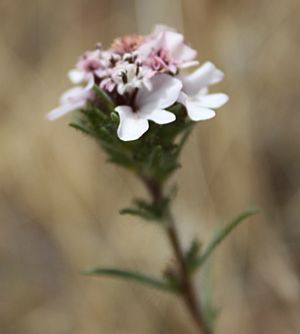Sticky calycadenia facts for kids
Quick facts for kids Sticky calycadenia |
|
|---|---|
 |
|
| Conservation status | |
| Scientific classification | |
| Kingdom: | |
| (unranked): | |
| (unranked): | |
| (unranked): | |
| Order: | |
| Family: | |
| Genus: | |
| Species: |
C. multiglandulosa
|
| Binomial name | |
| Calycadenia multiglandulosa |
|
| Synonyms | |
|
|
Calycadenia multiglandulosa is a type of flowering plant. It belongs to the sunflower family. People often call it the sticky calycadenia or sticky western rosinweed. This plant grows only in California. You can find it commonly in the Coast Ranges. It also grows in the Sierra Nevada Foothills. Its range stretches from Shasta County down to Kern County.
Plant Features
This plant is an annual herb. This means it lives for only one growing season. It grows a straight stem that can reach up to 70 centimeters (about 28 inches) tall. The stem is covered in tiny hairs and special sticky glands.
The leaves of the sticky calycadenia are long and thin. They can grow up to 8 centimeters (about 3 inches) in length.
Flower Heads
The plant's flowers grow in dense groups called clusters. Each cluster has many small flower heads. These flower heads are surrounded by long, narrow leaves called bracts. These bracts are also covered in clear, round glands. These glands make the plant feel sticky.
Each sticky flower head has two main parts. In the center, there are several small disc florets. Around these, there are a few ray florets. These ray florets can be white, yellow, or red. Each ray floret has three small tips. The middle tip is the shortest one.
Seeds and Fruit
After the flowers bloom, they produce fruit. The fruit is a type of seed called an achene. The achenes that come from the disc florets have a special feathery or scaly top. This top is called a pappus. It helps the seeds to spread.


